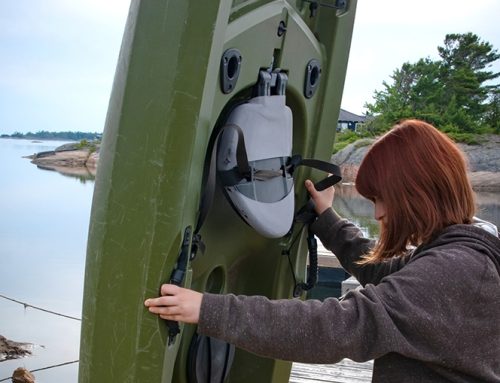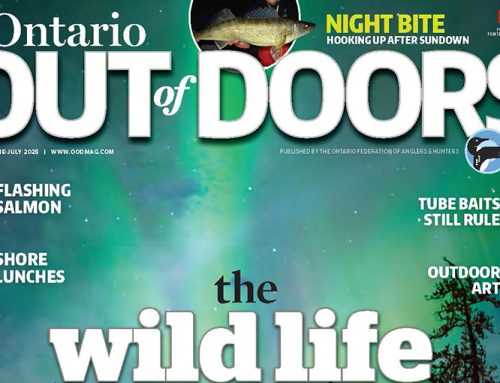
“Seventy feet to go,” OOD Editor/Associate Publisher Ray Blades said, glancing at the reel’s line counter display.
“Be ready. Quinte walleye often wake up and fight harder the closer they get to the boat.”
Not long after guide Greg Amiel imparted this advice, the rod in Blades’ hands came alive, bouncing with the weight of the day’s first fish. Steadily gaining line, Blades kept the walleye out of the prop wash as it neared the surface, and Amiel proficiently netted it with a flawless execution earned by repeating the same action thousands of times.
As Blades held the fish for a few quick photos, the morning sun lit up the chunky eight-pounder broadside, accentuating its golden hue. My photos didn’t do it justice because, in that moment, you’d be hard-pressed to find a fish more striking than the Bay of Quinte walleye he was holding. Then it was gone, swimming again in the clear, cold water.
Blades and I arrived in Prince Edward County the night before and stayed at the Picton Harbour Inn. We met Amiel at 6:30 a.m. at the inn’s docks, where he moors his Lund 2075 Tyee when Quinte guiding.
On the books since early spring, I’d been anticipating this December trip all season — and thanks to good company, great weather, and cooperative walleye, it turned out to be a fantastic day of fishing.
The lure of the Bay
By mid-October in many waterbodies, sizeable groups of walleye can be found where they’ll stay during winter. What makes the Bay of Quinte special is that this pattern unfolds on an epic scale with trophy fish.
“Large, Lake Ontario walleye migrate into Bay of Quinte in the fall. They basically follow the bait from the lake and then they spawn there in the spring,” Amiel said. “These are slow-growing fish. Lifespans could be almost 20 years on these big fish, 12 to 15 years are common.”
Amiel’s biggest Quinte walleye are 15 and-a-half pounds; he’s caught four of them. Autumn fishing here brings the potential of catching a fish of a lifetime, along with good odds of encountering eight to 10-pound fish.
The bay’s resident walleye deserve mention, though. Generally five pounds or less, these fish live throughout the system and can be caught using various tactics year-round. It is the big, migratory Lake Ontario walleye, however, that give the Bay of Quinte its world-class reputation. Even walleye anglers who’ve never visited are likely to recognize the waterbody’s popular sections.
Adolphus Reach is one such area. It holds the deepest water and begins just beyond the bay’s entrance near Amherst Island, eventually decreasing in depth as you move towards Glenora. Here, the Bay of Quinte’s common characteristics take hold.
“Most of it is soft bottom, but you do have rocky shoals and rocky points, and there’s always generally a light current heading from west to east, from Trenton all the way throughout to Lake Ontario,” Amiel said. “Bay of Quinte has various depths, structures, and water clarity. Keep in mind, these larger walleye are open-water, roaming fish, so contour fishing is not as crucial in the fall compared to the spring.”
Farther inward lie Picton Bay, Thompson Point, Hay Bay, Shermans Point, and Long Reach — all popular walleye trolling areas. Beyond Deseronto, the Bay narrows and passes under the Quinte Skyway Bridge. Its waters widen at Big Bay before constricting somewhat at Belleville, then continuing beyond Anderson Shoal and then just beyond the Trend River’s outflow.
Where to begin
“In the fall, fish should be throughout the whole system because you still have your resident walleye. But, when you’re talking about lake walleye, there should be big fish from Belleville all the way through to the lake,” Amiel said.
Another important detail is the migratory Lake Ontario walleye in Quinte are baitfish oriented. Walleye location shifts in accordance with the nomadic behaviour of their prey. This makes a quality fish finder essential for locating fish.
“Drive around and use your sonar to mark bait and look for big hooks. That’s where you’re going to catch fish,” Amiel said. “Active walleye tend to feed higher in the water column, so targeting the highest hooks on your sonar is key.”
Knowing where prey and predator are within this massive Lake Ontario inlet is one of many reasons to consider hiring a reputable guide who’s tuned into walleye movements. Many times, I’ve visited Quinte with friends and put together a program. We spent a good chunk of our time, however, eliminating unproductive water and didn’t catch as many fish as Blades and I did with Amiel, who had us on biting walleye in short order.
The trolling program
Trolling deep-diving crankbaits on long lines behind inline planer boards is Amiel’s preferred method for big, suspending Quinte fall walleye.
During our trip, walleye holding at 18 to 22 feet couldn’t resist Rapala’s Down Deep Husky Jerks run 80 to 100 feet behind Offshore Tackle Inline Planer Boards and swimming 1.5- to 1.8 miles-per-hour.
Anglers can also have success trolling stickbaits and shallow-running cranks on four to five colours of lead core, Amiel pointed out. Jet and Dipsy Divers are other options for getting baits into the strike zone of suspending walleye.
As you’d expect, typical trolling advantages ring true on Quinte. The method covers water and, when done properly, keeps baits steadily swimming in the strike zone. Long-lining a crankbait behind an inline planer board moves the lure away from the boat, a key ingredient for getting bites from easily spooked walleye. Not to be overlooked, either, is how an experienced troller — which Amiel most certainly is — can maintain boat control and, in turn, consistently execute a proper presentation in rough water.
Ending on a high note
Early afternoon brought strong wind gusts, but this didn’t prevent us from catching several more fish before it was time to return to the dock. Until now, Amiel had given Blades and I every rod that fired, but we finally convinced him to join in on the fun.
Towards the end of the trip, Blades and Amiel hooked up with a double-header. Watching them laugh and reel in fish beneath a blue sky and a warm (for December) sun, I reflected on how lucky I was to have spent the day with good friends, catching big, golden walleye from the legendary Bay of Quinte. I hope someday you have an opportunity to experience the same on this iconic fishery.
Gear we used
- Shimano’s Tekota line counter reels for precise line control.
- G. Loomis E6X Walleye Trolling Rods. Eight-footers for inside trolling spread lines, 10-footers on the outside.
- 30-pound PowerPro Braid or 20-pound monofilament main line. Amiel runs both, as one can sometimes outproduce the other.
- 30- to 40-foot long, 15-pound fluorocarbon leader.
We were targeting fish at around 20 feet, so we didn’t use snap weights, but Amiel occasionally uses them to get baits deeper. For example, clipping on a 1.5-ounce weight about 50 feet in front of a crankbait with a total of 150 of line out can increase a lure’s running depth by approximately 10 feet.
When to visit
The Bay of Quinte’s resident walleye provide steady angling action all season. There’s a good spring bite in May and June but hooking double-digit walleye is most likely in fall. Big fish are typically caught from around mid-October through to the ice-fishing season.
Where to stay
We stayed at the Picton Harbour Inn, which is operated by brothers Scott and David Walcott, also local fishing guides, and Scott’s wife Sophia. Tucked within a sheltered harbour, the Inn provides convenient waterfront accommodations and is minutes from the boat ramp. Our room left nothing to be desired in terms of comfort, cleanliness, and amenities. We brought our own meals, but the Inn’s Lighthouse Restaurant is known for its delicious, homestyle meals. Rooms from $129 in November.
Originally published in the Nov.-Dec. 2022 issue of Ontario OUT of DOORS






I have nothing to say at this time….I just signed up minutes ago….